- Home
- Steven Harper
The Impossible Cube Page 5
The Impossible Cube Read online
Page 5
Simon got to his feet. His face was stony, but Phipps’s monocle told her that the heat in his body had shifted into a pattern she associated with anger, exactly the emotion her final remark had been calculated to engender. He stood at attention, unconsciously making himself stiff and hard as a fully capable man should be.
“Lieutenant,” he barked, “I am willing and able to carry out any orders you give me, as my oath to the Third Ward dictates.”
“Excellent, Agent d’Arco,” Phipps replied. “Your hard work will not go unnoticed. Dismissed.”
Simon saluted. The door snapped shut behind him, and his footsteps faded down the hotel hallway as he went to his own room. Glenda coughed.
“Fully capable man,” she said. “You know how to hit below the belt, Lieutenant.”
“Hm,” Phipps said, and stared out the window, though now it was dark and there was nothing to see.
“Just between us,” Glenda said, “and knowing that I’m perfectly happy to come along because I want to see Alice pay, why are you doing this? You did let them go, down in the Doomsday Vault.”
Phipps chose her words carefully. “Simon persuaded me not to kill Alice, but only because she had stopped Edwina Michaels’s device from exploding and killing us all. Simon said I owed her, and he was right. That debt is paid, and now it’s time for Alice and Gavin to pay their other debt to us. To the Empire.”
“That doesn’t quite answer my question,” Glenda said. “Why are you here? You never go into the field.”
“I used to,” Phipps said. “It’s where I started. My father was a military man, and he was away quite a lot. But he always sent home money to make sure my mother and I had food and clothes. And his brother, my uncle, visited often to ensure there was a man about.”
For a moment, the reflection in the window showed a Susan Phipps much younger, without the streaks of silver in her hair, and with the smooth features of a girl not yet twenty, but who still held the ramrod posture expected by her father, her dear father, who never showed emotion but who could grind her to the ground with a tiny frown or fling her to joyful skies with a simple nod. The reflection showed her younger self hurrying home on one of the rare days when Father was in town. He met her at the door of their row house with two carpetbags in his hand.
“The world is upside down,” he said simply. “I do not wish to live here any longer, so we are moving.”
Susan knew better than to ask why, but she felt she deserved more information, so she said, “I don’t understand, Father.”
“I found the love letters. As far as I am concerned, your disloyal mother is dead, and so is my brother.”
Susan remembered the overwhelming despair, the fear, and most of all, the anger. Not at Father, of course, but at Mother, who had committed such a betrayal of loyalty. The bedrock of Susan’s life, her parents’ marriage, had crumbled into sand, and it was Mother’s fault. It had to be. Otherwise Father would be in the wrong, and that was unthinkable.
“Loyalty, Susan,” Father had said as they climbed into a cab. “Loyalty.”
For a while, Susan wondered if Father’s reference to Mother’s death was metaphorical or literal. She never heard from Mother again, but neither did the police come for Father. No one was even reported missing, and for the first time Susan wondered what sort of work Father did for the military. Eventually Susan dismissed the matter as unimportant. A few years later, Father introduced her to Lieutenant Lawrence Garrison, who asked if she wanted to join the Third Ward. When she replied in the affirmative, Father gave her a small nod.
Phipps’s hands clutched the windowsill. Her right fingers turned white, and her left ones left dents in the wood. “I made a terrible mistake when I let them go, Glenda,” she said, “so it is my duty to set it right. Gavin and Alice unloosed several dangers into the world, and we must bring them into custody before they do further harm.”
Glenda gave her a long look, then rose. “I understand. If I may, Lieutenant?”
Phipps nodded a dismissal and continued to stare out the window. I’ll find them, Father. I’ll set the world aright for you. For us.
Chapter Three
Alice glared down at the unyielding numbers. They glared stubbornly back, hard little loops and corners that wouldn’t move no matter how hard she tried. Twice she had rubbed them off the page and run through them again, but they always came out exactly the same. She resisted the urge to throw the book overboard. Instead she snapped it shut and slipped it into her trouser pocket so she could lean on the gunwale to think while cool morning air washed over her like water.
In the distance ahead, airships of all sizes and designs floated, cruised, and hovered above the sprawling city of Luxembourg like tame clouds. London controlled airship traffic, but Luxembourg apparently didn’t. Alice glanced over her shoulder at Gavin, lean and strong at the helm of their ship. The rising sun caught his pale blond hair and turned it nearly white, making a stark contrast with the torn black clothes he still wore from last night. His sharp features and long jaw made her hunger for a kiss. He caught her eye and grinned that grin that always sent a delicious shiver down her back. And she felt all that when he was silent. When he sang, his voice melted her soul. She’d follow him into a volcano if he only sang to her first, and a part of her was glad he didn’t seem to know that yet.
And there it was. In the end, she had betrayed her country for him. She had broken into the Doomsday Vault and released the clockwork cure, an act which would eventually destroy the British Empire as she knew it. And all for the simple reason that Alice, Lady Michaels, had fallen in love with Gavin Ennock. What would the history books say about that? The thought that schoolchildren might one day read about her both fascinated and frightened her. What gave her the right to change the course of mankind for the love of a man?
The book of figures sat heavy in her pocket. Alice leaned out into the fresh breeze, trying to feel the freedom she knew carried Gavin forward. All her life she had followed the rules of traditional society, done as her traditional father had told her. And then Gavin had innocently blasted her life to pieces. Now she was spending her days with not one, but three strange men, and no other woman around to chaperone. Frightening. Exhilarating. It was like standing at the edge of a cliff with one foot over.
Below the ship lay a rumpled checkerboard of fields and pastures bordered by hedgerows and stone walls that surrounded the city proper. Arteries of rail and cobblestone ran in and out of the place. Canals threaded through it, and church spires pointed at Alice like accusing fingers. Castles with rounded walls took up the hills, and square houses occupied the slopes. It looked both foreign and familiar at the same time.
Several miles from the city, the Lady of Liberty’s blue glow dimmed, and the ship began to sink. Startled, Alice turned to Gavin, who was moving from the generator back to the helm. “Is something wrong with her?”
“We can’t dock at the shipyard,” he said. “Not if Phipps has gotten word out about us and what the Lady looks like. But I think I know a place.”
They came down in a weed-filled pasture surrounded by a scraggly hedge on three sides and a stand of trees on the fourth. Near the stand of trees were a small stone farmhouse and a large stable, both half in ruin. Kemp, Dr. Clef, and Feng emerged from below to see what was going on. Sunlight gleamed on Dr. Clef’s brass goggles, and he pushed them up on his forehead.
“Cut power to twenty percent, Alice,” Gavin ordered.
Alice leaned over the generator and restricted the flow of air and paraffin oil. The machine responded to her precise touch, and she thought about opening it up to poke around inside. Alice wasn’t a clockworker, but she was startlingly talented with the machines clockworkers created. Usually, only a clockworker could create and maintain the fantastic steam-driven inventions that let Britain and China dominate the world. In her short time with the Third Ward, Alice had encountered a number of mind-bending inventions that frightened her out of her wits. Weightless metal and walki
ng trees were just the beginning.
Normal people were able to reproduce a few clockwork innovations—Babbage engines that allowed machines to retain information and appear to think. Tempered glass that let airmen create weapons that wouldn’t spark amid dangerous hydrogen. Designs for dirigibles. Electric light. But the vast majority of clockworker inventions were so complicated, so complex, that only clockworkers could create them, and their work seemed limited only by the materials they could afford. Normal humans couldn’t assemble the materials, even with careful diagrams or instructions. Even taking most inventions apart without breaking them was nearly impossible.
Alice, however, seemed to be unique in the clockwork world. She alone could understand, assemble, and repair clockwork inventions. She had, for example, assembled Click and Kemp with instructions from Aunt Edwina, along with over a dozen spiders and whirligigs, and could strip a clockwork machine to its component cogs in minutes, though this odd ability didn’t extend to the spider gauntlet currently gripping her left hand.
Alice had spent considerable time trying to pry it off, and with every tool at her disposal. It wouldn’t budge. She couldn’t even find a way to open it. It stoically wrapped her forearm and fingers, tipping her fingers with its claws and filling its tubules with her blood. It didn’t restrict her movements, and it left the underside of her hand uncovered, so she didn’t lose sensation, but she still found it… unsettling. It was always there, burbling to itself and dragging at her arm. The demon spider was a part of her now, and she a part of it. So far the demon did everything she required of it, except come off, but she wondered what would happen on the day her desires ran counter to its.
Under her ministrations, the generator’s power dropped and the envelope’s glow dimmed. The Lady descended toward the abandoned farm buildings and touched the ground in front of them with a delicate bump.
“Perfect landing,” Feng said. “You are quite skilled.”
Gavin flashed the heart-stopping grin, then cast lines over the sides. “Let’s get to work. That barn—stable—is big enough to hide the ship in.”
Once the passengers, including Kemp, dropped to the ground, the ship rose a few feet. Everyone took a line and towed the ship toward the two-story stable, which was really little more than an empty shell. The ship barely squeezed through the gaping space left by the missing main doors, and the group lashed her in place at Gavin’s direction, then edged around her to get outside into the late-summer sunlight. Click looked down at them smugly from the stern, clearly pleased that he didn’t have to do any of the work.
“How did you know about this place?” Alice asked.
Gavin shuffled a little, momentarily looking like the teenager he technically was. “Sometimes the Juniper carried cargo that Captain Naismith didn’t want the port authority in Luxembourg to see. We used to drop it off here and pick it up later.”
“Smuggling?” Alice raised an eyebrow. “Mr. Ennock, I am shocked!”
“Well, Luxembourg has high tariffs on certain items that made it more expensive to ship them in than the goods were worth, and we couldn’t always be— Oh.” He caught sight of Alice’s expression. “You were joking.”
“The famous dry British wit,” Feng observed. “So much like my father’s.”
“Madam,” Kemp said, “I am afraid I have to report that the food stores are nearly empty. Breakfast this morning drained what little we had.”
“Then we’ll have to get more,” Alice said. “How far away are we from the city?”
“Less than five miles,” Gavin said. “A decent walk, though we might be able to beg a ride from a farm wagon or a carriage. Alice, I think you should change into skirts. A woman in trousers attracts attention.”
“I was thinking the same thing.” Alice sighed. “And, Kemp, you and Click will have to stay behind with the ship.”
“Madam!” Kemp huffed. “It is my duty to attend to Madam’s every need and comfort. I cannot do that when—”
“The Catholics have made you illegal in Luxembourg,” Alice said patiently. “Besides, the Third Ward is looking for a group that’s traveling with a mechanical servant and a clockwork cat.”
“Madam,” Kemp replied stiffly. On the ship above, Click put his ears back.
“No worrying,” Dr. Clef said. “I will also stay. I am working on a new piece, and the clicky kitty will keep me company.”
“What about food?” Gavin asked.
“There is sufficient for one person for a day or two,” Kemp said. “I said we had little, not none.”
Dr. Clef looked sly. “And it gives farms about, with fruit and vegetables in the fields. If you are gone for a few days, it matters nothing.”
“Right.” Gavin rumpled his hair. “That leaves you, Feng.”
“Oh?” The young man struck a pose. He was, as usual, quite good-looking, though nowhere near as handsome as Gavin, in Alice’s mind. “Do I stand out?”
“I know!” Alice plucked the goggles from Dr. Clef’s forehead and drew them down over Feng’s head, then extracted a red scarf from her pocket and wrapped it around the lower half of Feng’s face. “There! With the right hat, you’ll look like an airman instead of a mysterious Oriental. Around here, that shouldn’t attract attention.”
Feng made a horrified sound. “I was hoping my exotic good looks would attract a great deal of attention, if you understand my meaning.”
“Mr. Lung!” Alice admonished. “That’s hardly appropriate.”
“That is why my father asked you to bring me back to Peking,” Feng pointed out. “Unlike my father, when I see a pretty piece of… a pretty face, I become a bad diplomat.” His voice was muffled through the scarf. “But for your sake, my lady, I will try.”
“Your Ladyship,” Alice corrected. “A baroness isn’t rightly addressed as my lady.”
“You see? Bad diplomat.” He straightened the goggles. “Let us go now. I will be hungry soon.”
“Feng,” Gavin said, “the jar?”
Feng’s almond eyes widened. “How could I have forgotten?” He dashed for the ship.
Alice, meanwhile, quickly changed into skirts in her tiny stateroom belowdecks and snatched up a cloth airman’s cap for Feng. She also took the book of figures. Gavin had changed out of his torn black clothes into a plain workman’s outfit, complete with a cloth cap of his own. He wore his fiddle case on his back, since he rarely went anywhere without it. Feng appeared with a rucksack that clinked. They bade Dr. Clef and the mechanicals good-bye and left.
“Are you still a baroness?” Gavin asked as the trio set off down the dusty, hedge-lined road toward Luxembourg. “I mean, you left the country and abandoned your fiancé and became a traitor, so—”
“Titles are for life,” Alice said. “My father was the last Lord Michaels, and I was his only child. His only relative, really. When he passed away, that left me Alice, Lady Michaels, and I will be until I die, no matter how scandalously I behave, though if I have a child, things become complicated.”
“How?” Feng inquired. His feet kicked up small puffs of dust that hung on the still air. Birds called from the hedges and the trees that grew among them, and cows lowed from their pastures.
“For the line to continue, any child I have must be legitimate,” Alice said, flushing a little. The subject still made her uncomfortable, even though England was hundreds of miles away. “If Gavin and I don’t marry in a Christian church, our children won’t be…”
She trailed off in horror, realizing what she had just said. Gavin would never live to see children. Tears welled up, and she looked abruptly away.
Gavin squeezed her hand. “I don’t care if they’re titled or not,” he said brightly. “We aren’t going back to England, and that’s the only place the title matters. You will be my wife on our airship and the whole world will be our estate!” He spread his arms wide, then swept her into a kiss. “There! Title that!”
Alice had to laugh. “Thank you, Mr. Ennock.”
“
You’re welcome, Miss No-Longer-Lady-Alice-Michaels,” he said impishly.
“I believe I will call you Miss A,” Feng said. “If you prefer.”
“Actually, I would not,” she said. “The Third Ward uses Christian names among themselves to show comradeship and to emphasize the fact that they operate outside the usual boundaries of society. Since we are traveling together outside the boundaries of society, and I have little use for my title anymore, I think I would prefer my Christian name. Feng.”
He put his fist into his hand and bowed to her in what Alice assumed was an Oriental fashion. “Then it will be so. Alice.”
“You must be looking forward to going home,” Alice said as they continued to walk.
Feng blinked at her. “What a strange thing to say.”
“Is it? I would think you would miss your homeland, though I would imagine it’s difficult to leave your father. Your mother will certainly be glad to see you.”
Feng was silent for a long moment. Then he said slowly, “I am not returning as any kind of hero, Alice. I thought you knew that.”
“Sorry?”
“I am returning in disgrace. The lowest disgrace you can imagine.”
“I don’t understand,” Gavin put in. “You and your father don’t want you to be a diplomat, so you’re going home to—”
“That is exactly the point, Gavin. I am a nephew to the emperor and my father’s only son. I should be following into his profession. But my father has decreed that I have failed him and the family, which includes the emperor.” Feng’s usual carefree demeanor had left him. The words came out slow and dull as lead pipe. “I am a failure and a disgrace. If I am very lucky, I will spend the rest of my days scrubbing chamber pots with the servants.”

 The Importance of Being Kevin
The Importance of Being Kevin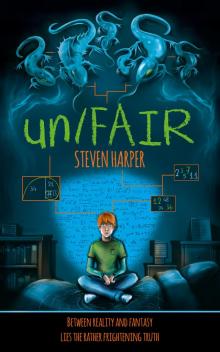 un/FAIR
un/FAIR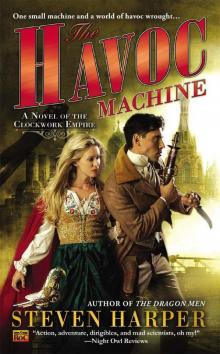 The Havoc Machine
The Havoc Machine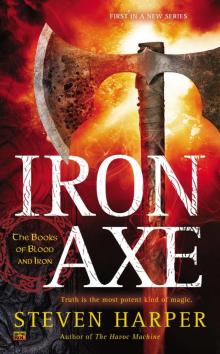 Iron Axe
Iron Axe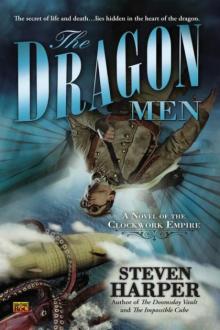 The Dragon Men
The Dragon Men The Doomsday Vault ce-1
The Doomsday Vault ce-1 The Doomsday Vault
The Doomsday Vault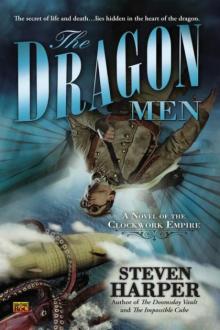 The Dragon Men ce-3
The Dragon Men ce-3 The Impossible Cube
The Impossible Cube Blood Storm: The Books of Blood and Iron
Blood Storm: The Books of Blood and Iron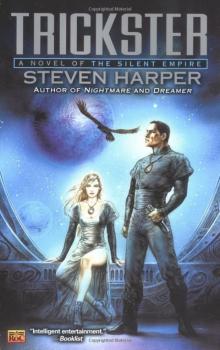 Trickster se-3
Trickster se-3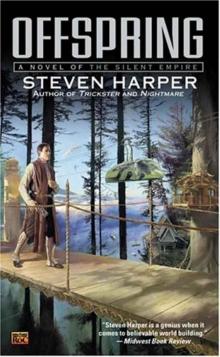 Offspring
Offspring Bone War
Bone War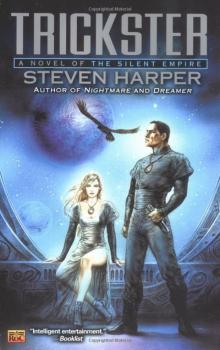 Trickster
Trickster Unity
Unity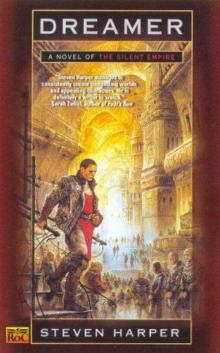 Dreamer
Dreamer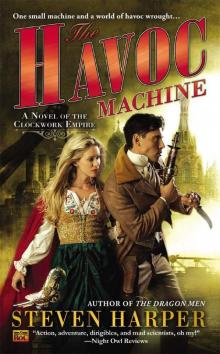 The Havoc Machine ce-4
The Havoc Machine ce-4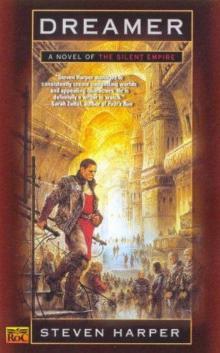 Dreamer se-2
Dreamer se-2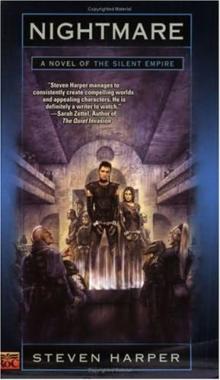 Nightmare se-2
Nightmare se-2